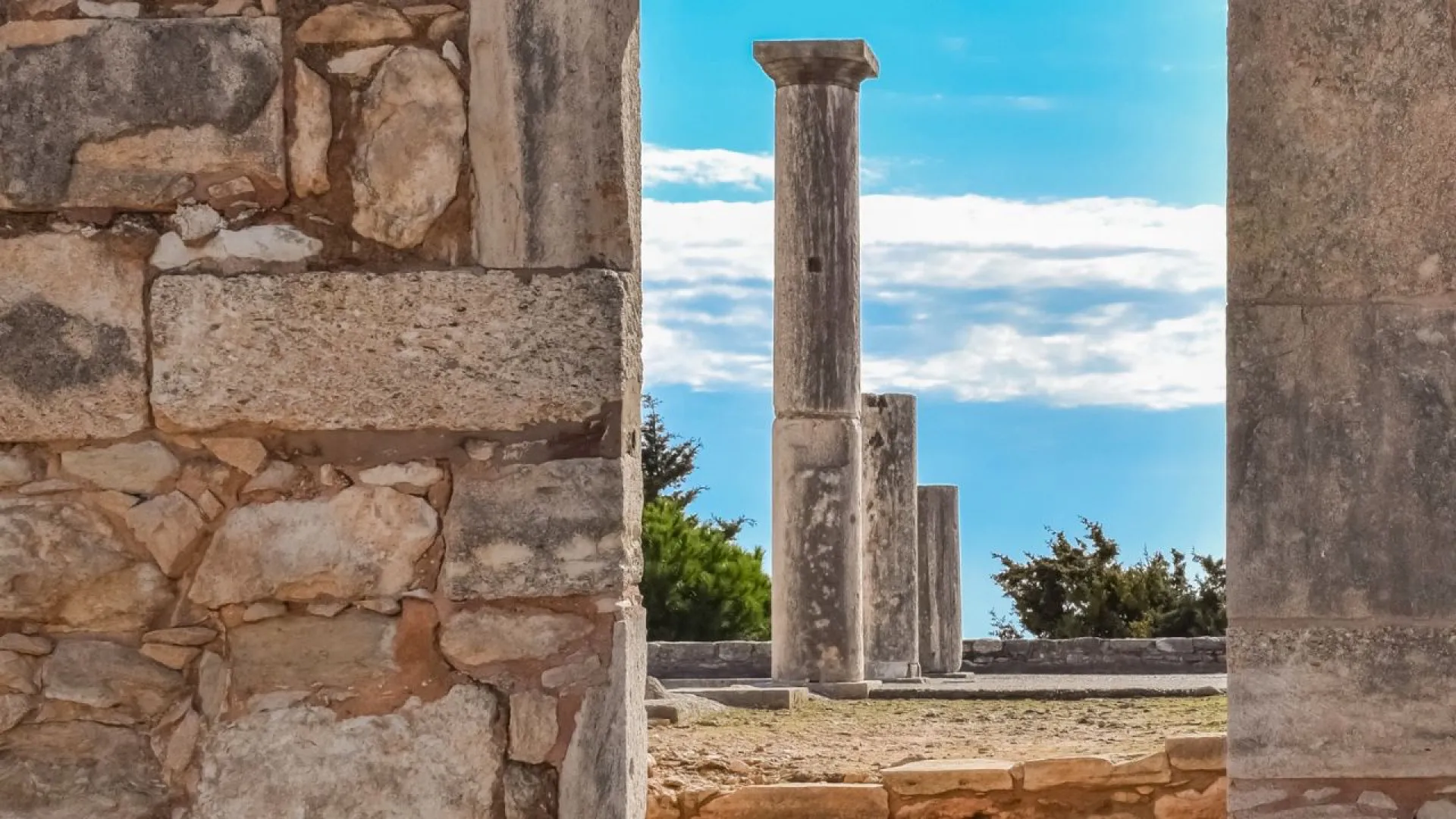




Cyprus, the third-largest island in the Mediterranean, is geographically a single entity, but politically, it's divided into two distinct halves. This unique situation often leads to confusion for long-term travelers, digital nomads, and expats who choose to start a new life here. The choice between the internationally recognized South, the Republic of Cyprus, and the northern part, the Turkish Republic of Northern Cyprus (TRNC), which is only recognized by Turkey, has far-reaching consequences for daily life, legal status, and quality of life. It's a decision that requires sound knowledge to find the best conditions for your own Living in Cyprus.
This article will shed light on the crucial differences between the two parts of the island. We’ll provide a factual and practical comparison of the political and legal frameworks, cost of living, real estate markets, and cultural aspects. Our goal is to give you a clear basis for your decision, so you can find the region that best suits your personal goals and lifestyle. Join us on this journey to understand the two fascinating worlds of a single island.
The most fundamental difference between North and South Cyprus lies in their political and legal status, which influences all other aspects of life. This point is crucial for anyone planning to live on the island permanently.
South Cyprus is the internationally recognized Republic of Cyprus and has been a member of the European Union since 2004. For EU citizens, this means they enjoy all the rights of free movement. They can enter without a visa, stay for up to 90 days without a special permit, and have the right to settle and work there. The formalities for a long-term residence permit (the Yellow Slip) are clearly regulated and straightforward. After five years of continuous residence, you can apply for a permanent residency permit. The legal system is based on British Common Law, is transparent, and provides legal certainty.
The official currency is the Euro (€), which makes daily life significantly easier for travelers from the Eurozone. The official languages are Greek and Turkish, but due to its British colonial history, English is widely spoken in all public and private sectors. The entire administrative, legal, and financial infrastructure meets European Union standards, which provides a sense of security and familiarity for many expats.
In contrast to the South, the Turkish Republic of Northern Cyprus (TRNC) is recognized internationally only by Turkey. This has significant legal implications. For EU citizens, entry via an airport in North Cyprus (Ercan Airport) is considered illegal from the EU's perspective, as it is not an official point of entry into the EU. Most travelers, therefore, enter the island via an airport in the South (Paphos or Larnaca) and then cross the Green Line. The currency in North Cyprus is the Turkish Lira (₺), which can lead to currency fluctuations and inflation risks that directly affect the cost of living.
The right of residence in North Cyprus is not bound by EU standards and is governed by local laws. While the process for a residence permit is often less bureaucratic and faster for many nationalities than in the South, it lacks international legal protection. A particularly sensitive and complicated area is property law. Many properties in North Cyprus are owned by Greek Cypriots who had to flee in 1974. This has led to complex legal disputes, and buying a property here requires extreme caution and specialized legal advice.
The "Green Line" is the military-controlled buffer zone that separates the two parts of the island. It is passable for people at several checkpoints. For long-term travelers and expats, this means it's possible to live in one part of the island and visit the other for work, travel, or leisure. An expat based in South Cyprus can easily take day trips to the North to visit historical sites or cheaper markets, and vice versa. This freedom of travel makes the concept of Living in Cyprusparticularly flexible, allowing you to enjoy the benefits of both worlds without having to be limited to just one side.
Daily expenses and economic stability are of utmost importance for anyone planning a long-term stay. The biggest difference in this area between North and South Cyprus is the currency, which has far-reaching consequences for budgeting and financial planning.
As a member of the Eurozone, the Republic of Cyprus uses the Euro (€) as its official currency. This offers high financial stability and transparency, especially for long-term travelers from other EU countries. Prices are clear and comparable, and there are no currency risks that could make your budget unpredictable. The cost of living in South Cyprus is generally higher than in the North, but still moderate compared to many Western European countries. Prices for groceries in supermarkets and restaurants, as well as rent in urban centers like Limassol or Nicosia, are the highest.
A typical monthly budget for a single person could be between €1,000 and €1,500, depending on location and lifestyle. The costs for public services like electricity and water are regulated and predictable. Fuel prices are also stable, though often higher than in countries like the UK or Germany. The financial infrastructure is modern and secure, with a wide range of banks and financial service providers that are subject to EU-wide standards. This stability makes financial planning for your Living in Cyprus in the South very reliable.
In North Cyprus, the official currency is the Turkish Lira (₺), which has been subject to significant currency fluctuations and high inflation in recent years. While prices in Lira may appear lower, these exchange rate fluctuations can strongly affect the purchasing power of currencies like the Euro or British Pound that expats often use. The cost of living can be very affordable one day and significantly more expensive the next, depending on the current exchange rate.
Prices for groceries and services are generally lower than in the South, which makes North Cyprus attractive for budget-conscious long-term travelers. However, many larger purchases, such as real estate or cars, are often conducted in British Pounds (£) or US Dollars ($) to avoid currency risks. Rents are also increasingly negotiated in stable currencies. The financial infrastructure is less developed, and international bank transfers can be more complex. This financial uncertainty is an important aspect that must be considered when deciding on your Living in Cyprus in the North.
Choosing the right home is central to any long-term stay. The real estate market in North and South Cyprus differs not only in price but also in legal security and the types of properties available.
The rental market in the South is established and secure. In popular cities like Limassol and Paphos, modern apartments and villas are available, though they come with higher rental prices. Rents have risen in recent years due to strong demand. Contracts are generally legally sound, and security deposits are managed by landlords. In smaller villages, rents are more affordable, but the selection of modern properties is smaller.
In North Cyprus, rents are often significantly cheaper, which is a major incentive. For a comparable property, you often pay only half the rent in the North compared to the South. The selection of apartments and villas is large. However, rental contracts and processes are less formalized, which can lead to potential uncertainties. It is advisable to consult a local lawyer here as well.
This is perhaps the biggest and most important difference between the two parts of the island.
South Cyprus: Buying a property in the Republic of Cyprus is a secure process, backed by EU law and the Cypriot legal system. The land registry system (Title Deeds) guarantees that the buyer's ownership rights are fully protected. Purchase prices are significantly higher than in the North, but they offer the security of a recognized legal title.
North Cyprus: Buying property in North Cyprus is a complex issue. Due to the 1974 conflict, the ownership of many properties is disputed. There are different types of land titles:
Turkish Title: Land owned by Turkish Cypriots before 1974. This is considered the most secure title.
TRNC Title: Land that passed to the government of Northern Cyprus after 1974.
Exchange Title: Land that was exchanged for property in the South.
Leasehold: A type of lease agreement, often for larger construction projects. The legal validity of these titles is not internationally recognized, which could lead to problems in the future. However, prices are significantly lower. A potential buyer must be aware of the risks and should absolutely seek specialized legal advice. The decision to pursue Living in Cyprus by buying a property in the North should not be taken lightly.
The quality of infrastructure and the availability of services significantly influence the daily lives of long-term residents. There are clear differences here that are directly related to the political and economic realities of the two parts of the country.
As an EU member, South Cyprus benefits from extensive funding invested in a modern and reliable infrastructure. This applies to all key areas: the road network is in excellent condition, public transportation is well-developed (especially in the cities), and the airports (Larnaca and Paphos) are internationally connected. The supply of electricity and water is stable and meets European standards. Telecommunications networks offer high-speed internet and reliable mobile connections, which are essential for digital nomads and remote workers.
The healthcare system in the Republic of Cyprus is also regulated according to EU standards. There is both a state healthcare system (GESY), which is accessible to residents, and a wide range of private hospitals and clinics. The medical care is of high quality, and many doctors and specialists are trained abroad. This gives expats and their families a high degree of security and comfort.
The infrastructure in North Cyprus is less developed compared to the South but is undergoing steady expansion. The road network is passable but may be less well-maintained off the main routes. Airports like Ercan Airport are only connected via Turkey, which complicates international travel. Internet speeds can vary and are often slower than in the South. Electricity and water supplies can also occasionally experience interruptions, especially in rural areas during the high season.
The healthcare system is generally more affordable, but the quality of medical care does not always reach the standards of the South. There are state hospitals and private clinics, but the equipment and range of specialized treatments may be limited. Most international expats in the North opt for private health insurance to ensure a higher quality of care.
Aside from material and legal aspects, culture decisively shapes daily life and social interactions. The two parts of the island offer very different cultural experiences that directly affect the feeling of settling in and well-being.
The culture in South Cyprus is deeply rooted in Greek Orthodox traditions. Social life takes place in tavernas, cafes, and the narrow streets of the cities. Festivals, which are often of religious origin, are celebrated throughout the year. Cypriot hospitality is legendary, and people are generally open and friendly to newcomers. Since English is widely spoken, communication and integration are easy. The atmosphere in the major cities is dynamic and modern, with a thriving art scene and a wide range of entertainment and nightlife that is similar to a European lifestyle.
In North Cyprus, Turkish-Cypriot culture predominates with its Muslim traditions, which are reflected in the architecture, cuisine, and customs. The atmosphere is often described as calmer and more traditional. The pace of life is more relaxed, and daily life is less shaped by tourism and international influence than in the South. The official language is Turkish, but English is still spoken in tourist areas like Kyrenia or Famagusta. For those seeking a more authentic and down-to-earth life, North Cyprus can be very appealing. The social cohesion in communities is strong, and newcomers are often warmly welcomed.
The decision for Living in Cyprus is a choice with many facets. The comparison between the North and South of the island shows that there is no universal "right" answer. Instead, it's about defining your own priorities and weighing your options.
South Cyprus, the Republic of Cyprus, offers the security and stability of an EU country with an established legal system, a stable currency, and a modern infrastructure. It is a comfortable place for those who value legal certainty, convenience, and a European lifestyle.
North Cyprus, on the other hand, stands out with its often significantly lower cost of living, more affordable rents, and a calmer, more traditional atmosphere. Those who are willing to deal with the challenges of a system that is not internationally recognized will find a unique way of life here.
Both sides of the island have their own charm and their own advantages. Your choice ultimately depends on what is most important to you: the security and convenience of EU standards or the affordability and unique cultural character of the North. Regardless of what you choose, the island offers year-round sun, hospitality, and an unparalleled quality of life.
We use necessary cookies including analytics to ensure our website works properly and to understand how to improve your experience. By continuing to browse, you accept our use of necessary cookies. Click "Accept All" for personalized content and offers.